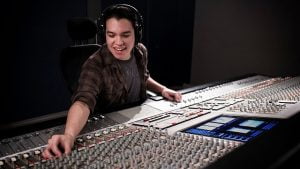Music is a great form of expression. It is said that music has its language. If you want to express something, you don’t need any language if you can express it in music.
If you are the one who has passion, love, and ability in music, there are many careers you can take up.
Here are the top 12 music careers.
1. Singer/ Vocalist
If you have a good voice and if you sing well, then you can become a singer. Singers are the hero of any song. They are the centerpiece of the music that is played. All the other artists/ instruments follow their scale to a tune.
India gives opportunities in many forms.
You can become a playback singer in India or a stage singer or can be part of a band. There are several genres of music and you must try to develop yourself in the genre you most fit into. These genres can be Bollywood, Classical, Karnatic, pop, jazz, rock, gazals, bhakti sangeet or even mataki chowki or church music, bhajans. K-pop is a popular genre nowadays.
How to be a professional singer?
To be a good and then a great singer you must practice singing daily with a guru or a teacher. You must first identify your genre you should practice the genre with accompanying instruments on a sound system to practice like a professional.
To establish as a singer you must get connected to people who matter in the business. You need to start creating your followers on social media like YouTube, Instagram, or Facebook. Generally, these followers participate as 50% of the audience in your sessions. Learn these skills too.
2. Instrumentalist

Instrumental Musicians play one or more musical instruments in recitals, in accompaniment, or as members of an orchestra, band, or a musical group. They also practice musical instrument performances, individually or in rehearsal with other musicians, to master individual pieces of music or to maintain and improve skills.
Besides their typical day, Instrumental Musicians also sight-read musical parts during rehearsals. They may also perform before live audiences in concerts, recitals, educational presentations, and other social gatherings.
To some Instrumental Musicians, it is also their responsibility to arrange and edit music to fit style and purpose.
In India, instrumentalists play a key role whether it’s classical music, playback, ghazals, or even rock or pop bands. Many instrumentalists perform solo or as lead musicians in concerts. Instrumentalists have created their band with other musicians. Most of the music directors in Bollywood are originally instrumentalists. If you are good at it, you can have a duo or trio with a singer and another instrumentalist. Start working in clubs or private parties.
3. Music Composer

As the name suggests, Music Composers are the ones who create music tunes across any genre. These professionals think about sounds and create tunes. Think about how different instruments or voices will sound together in a composition. Then they write the musical notes and form music or create music.
These are the real creative minds behind whatever music we hear.
To become a music composer, you must know a little bit about singing and playing instruments. Expert in playing one or more instruments will help.
Composers aren’t just tied down to the classical music genre; they can write for film, TV, and video games. They can also write and arrange recorded or live music across genres. Regardless of which avenue you wish to pursue, you must have a masterful understanding of music theory and have the technical capabilities to capture your compositions effectively, whether it be through music notation or recording.
Formal education and experience are keys to success here.
Composers are proficient in one or many instruments and have a deep understanding of music theory and arrangement. Being a great composer means understanding the technicalities and mechanics of music on multiple levels. Start learning composition software and begin practicing. There are event elements of sound engineering that can come in handy, like notation software and recording programs.
4. Music Arranger
Arrangers write original new adaptations of existing pieces. An Arranger reworks and adapts existing compositions by changing instrumentation, adding orchestration, and changing harmony, tempo, and musical style or genre. Arrangers are employed in the live music and recording industry, as well as in film, musical theatre, radio, and TV.
An Arranger might write a string or horn parts
An Arranger might write string or horn parts to be added to a pop song written by another artist. Most arrangements will keep the melody, lyrics, and structure of the original piece so that they can be easily recognized, while reworking the song or composition by restructuring certain musical elements, adding new harmonies, or paraphrasing different sections. They take an existing melody and provide variation by adding to or detracting from parts of the music.
Arrangers have a lot of creative freedom to express themselves.
They might decide to use new chords to support the melody, increase or minimize the instrumentation, adapt for a completely different style or instrumental setting, change the tempo or meter, change the key, add a new intro or ending, or add vocal harmonies. An Arranger can have as much influence on the final version or a piece as the original Songwriter, Composer, or Producer.
5. Sound Engineer

If no one knows how to record high-quality music by bringing out the best in each piece of recording equipment, how will any good music get made?
A Music Engineer is a person who makes sure the music piece reaches the audience, exactly in the way the composer or producer has envisioned. The vision of the composer is incomplete without an expert sound engineer.
They work in recording studios, or live programs working on those complicated-looking gears and playing on the keys to make sure that every piece of the music is at its best and perfect.
They set up the stage for great music
They set up the stage for great music, mics, the equalizers delays, and mixing and balancing of all the musicians and their sounds together to create the music we all love.
The climate of their work can be studio or live music whether it’s a band, a music album or an ad film or a background score, or an ad film, they are the technical music experts.
To be a sound engineer, you need to have a great understanding of music, an understanding of the sounds and their effects, good understanding of the various electronic music gears. They work closely with musicians, composers, and producers. They enjoy every bit of their work.
6. Artists Manager
If you love music and love being surrounded by music all the time but you are not a musician yourself, then becoming an artist’s manager is the best thing that can happen to you.
An artist manager exists to create opportunities, connect, and propel the musical act forward in the music business.
You have to wholeheartedly believe in your artist and help them build a strong and sustainable career through planning, organization, directing, and negotiating. You may not get all of the credit and adoration that the artist gets, but you’ll have to do as much—if not more—work! See In a picture you probably recognize all the musicians in Beatles and know their names. But how about the man behind their activities and busy music schedules. Brian Epstein, the manager of the Beatles during their rise to fame. Without the influence of Brian Epstein, likely, you’d never know the names John, Paul, George, and Ringo, much less know any of the music they made.
Management and leadership skills are key here.
Not only will you be streamlining and organizing multiple moving parts between musicians, publishers, and booking agents but you’ll also be making sales calls, negotiating contracts, and giving constructive criticism.
You need to ensure your artist is comfortable and gets the popularity he deserves.
This career is very interesting but requires busy work hours, schedules, and a lot of hard work. It also requires staying alert of any opportunities. If your artist is a business, then it’s like, you are the CEO.
7. Music Producer
If you want to be a Music entrepreneur, then you want to be a music producer.
A music producer understands both the creative and commercial side of the business and develops relationships with both musicians and the record label. A producer should create an environment that enables artists to create and express themselves.
A producer brings all the components of the music together, the songwriter, the composer, the arranger, the sound engineer, the musicians, the studio, the venue, the finances, everything. To be a music producer, you need to be in love with music in the first place and then great networking skills and money will add to your success.
If you’re looking to become a music producer, consider learning about foundational audio and music concepts, start studying various types of software, and dive into what makes a good sound. To be a truly great producer, you’ll need to acquire knowledge in engineering and mixing.
Look at the credits of your favorite albums: who produced them?
Who engineered them? Find out what other albums these people produced, and get even further acquainted with their style. Read interviews with these people about their techniques. There isn’t one path to success here, but you can forge your way as you develop the necessary skill set.
8. Disc Jockey

If you are passionate about music and love entertaining the crowd by playing and mixing music tracks, deejaying could be a career option worth pursuing. Once considered as just a fad in India, it slowly staked its claim as a viable career with multiple options and good money to make.
For the uninitiated, a disc jockey (DJ) has a great taste and knowledge of music and makes a career out of these interests. In the early days, the gramophone records were called discs and hence the term “disc jockey”.
In other words, a DJ plays music and also earns money for it. Cool, isn’t it?
DJs create music for an event or a radio audience by combining various genres and tracks through a variety of equipment like turntables, mixers, graphic equalizers, tape decks, and several other sophisticated sound processors.
There are mainly two types of DJs – those who work for the radio/ FM channels (radio DJs- popularly known as RJs) and those who work at clubs & perform for a live audience at events (club DJs.)
DJs need to have certain skills to be successful. Good understanding of different genres of music. Understand the crowd they are addressing. Good ears for music and the various technical aspects of electronic equipment. The DJs also need to have a friendly and outgoing personalities. They need to mingle with the crowd and respond to the crowd in a very positive and friendly manner.
9. Voiceover Artist
With the rise of social media and the upsurge of videos, the need for good voices is also increasing. Landing voice to others is a great career nowadays.
Voiceover artists land their voice in films, ads, videos, training videos, sales videos or blogs, or vlogs. TV commercials, radio ads, corporate communications, or even films, documentaries, theatres, story-telling, podcasting.
If you are a good singer or even if you have a good attractive voice or have a typical voice, then you can be in great demand if you want. The popularity of podcasts gives a great career opportunity too.
A Voice-over Artist is someone who uses their voice in radio, television, film, theatre, and other presentations. Sometimes they are in a dialogue between characters in a scripted radio play, but often referred to as off-camera or off-stage commentary or narration.
The work of a Voice-over Artist is all unseen and only heard. Your voice is everything that matters.
Additional skill required is mimicking, understanding the script, voice modulation
10. Music Therapists
Music Therapy establishes itself as a new field of complementary and alternate medicine (CAM),
In some cases, it works together with allopathy, homeopathy, naturopathy, etc. and increases the rate of recovery as complementary medicine, but in some cases, it is working as an alternate medicine such as Analgesic (paint remover) in pregnancy, infant and old age person, control anxiety, stress.
Music Therapy is the medicinal use of sound to treat or cure various types of disorders Music therapy works by influencing the neuro-endocrine system of livings and it is very effective in case of disorders related to the abnormality of neuro-endocrinology.
As we know our most of the behavioral and functional aspects of the body are the result of various types of metabolic reactions which are directly or indirectly controlled by the neuroendocrine system. So music therapy is an effective tool in the case of all types of disorders but it is not effective in case of emergency and where surgery is the only cure.
Music therapy is effective in a wide variety of healthcare but is very useful in case of:
- Cardiovascular disorders (CVD)
- Neuro-endocrine disorders, Hormonal disorders
- Pregnancy
- Anxiety, Stress, Depression
- Pain
- Growth and development
- Child behavior
Aspiring Music Therapists take courses in music, biology, psychology, physiology, social and behavioral sciences. Music Therapists must have at least a BA in their field. Those interested in graduate school can obtain an MA degree or a doctoral degree that combines music therapy with related areas of study. Aspiring Music Therapists who did not major in music for undergraduate can sometimes take equivalency courses before pursuing their MA, depending on the school.
All Music Therapists must pass a certification exam from the Certification Board for Music Therapists and continue to pass the exam every five years or take recertification credits. Successfully passing the exam will give the Music Therapist the designation of Music Therapist-Board Certified (MT-BC).
Colleges offering Music Therapy courses in India:
Indian Association of Music Therapy, Delhi
The Chennai School of Music Therapy, Chennai
MET Institute of Alternative Careers (MET IAC), Mumbai
Nada Centre for Music Therapy, New Delhi
The Indian Institute of Medical Music Therapy, Chennai
Sri Balaji Vidyapeeth, Puducherry
The Music Therapy Trust, Delhi
11. Music Teacher
Teaching Music can be a very fulfilling profession.
If you love music and understand the details of music and can develop a simple way of learning music, this is the profession for you. You can have your genre of music and can create a big community of disciples.
India has many traditional Gharanas in classical Music.
These Gharanas were patronized by kings in the olden times. Every Gharana has its style of presenting the different ragas and notations. They have a unique identity and rich heritage of musical traditions. These Gharanas are schools of music and are generally headed by some master or a guru. Many students enroll with these schools and learn the particular style.
If you have your unique style of singing or playing an instrument and if students of music love it, you can start your school of music. Big musicians like Suresh Wadkar and Shankar Mahadevan or AR Rahman have their modern music institutes very popular nowadays. With the rise of music reality shows, such schools are in demand.
Singers at different levels get opposed unity to perform on stage or on YouTube etc. They are interested in constantly brushing up their skills and styles. They like to learn these from good teachers.
12. Musicologist
Musicologists are people who research music.
Musicology is a research and study of the history of the phenomenon of music. This is a humanities topic and deals with the relationship of music with various subjects like sociology, geography, psychology, history, gender theory, anthropology.
This is a research-based career and requires a high level of interest in humanities. While most work as music professors at conservatories or universities, musicologists lack the technique-based approach most commonly associated with teaching music, instead preferring to view music through the lens of social science.
Ethnomusicologists, for example, study music in its cultural context, while cognitive musicologists examine how music manifests in the brain. Music historians, a large and highly diverse subgroup of musicologists, study music from a historical point of view, conducting archival and biographical work, researching performance practices, and exploring the function of music in societies.
You must do a degree and post-degree in Music in conjunction with another interest.
Conclusion

Music has big horizons if you want to pursue a career. The key here is the passion and love for music. The ability to sing or play an instrument then decides if you will be a performing artist or can choose another profession within the music industry.


